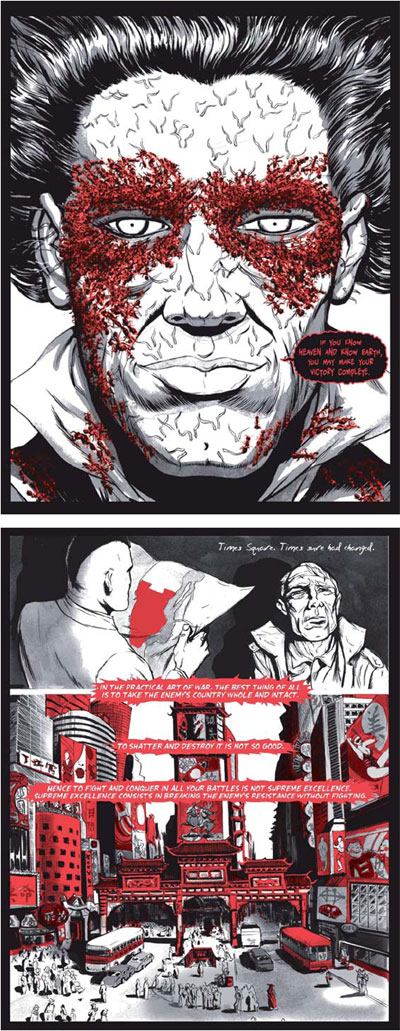Drawing lessons from The art of War
Updated: 2012-08-17 07:39
By Kelly Chung Dawson (China Daily)
|
||||||||
|
Roman's book The Art of War: A Graphic Novel. Provided to China Daily |
Chinese military strategist Sun Tzu gets resurrected in graphic novel
For more than 2,000 years, Sun Tzu's The Art of War has been revered as a tactical guide applicable not only to military combat but to politics, social navigation and business.
In Wall Street, the 1987 American film about corporate greed, Gordon Gekko repeatedly cites the Chinese general's wisdom: "Every battle is won before it is ever fought," he tells his protege. "I don't throw darts at a board. I bet on sure things. Read Sun Tzu."
When Kelly Roman, a creative writer and co-owner of PTSD-specialist medical company Fisher Wallace Laboratories, read in 2007 that the China Investment Corp had invested a portion of the nation's trillion-and-a-half dollar reserves on Wall Street, he began thinking about the intersection between business and national security.
"I thought to myself, 'At what point would you consider an investment with State money to be a legitimate national security interest?'" Roman says.
"I had always had an interest in The Art of War, and I thought it would be an interesting way to examine China's rise and how people in America feel about it. The text is studied in business school and quoted all over Wall Street to this day. As China has begun to surpass the US economically, the text has taken on a new relevance."
Roman's The Art of War: A Graphic Novel overlays Sun Tzu's text against a revenge story set 20 years in the future, in an imagined time in which Wall Street has become militarized and China is the dominant global superpower. The eponymous hero, Kelly Roman, has returned from serving time in prison for a friendly-fire incident in military combat, to find that his brother has been murdered while working for Sun Tzu, the head of a powerful financial company controlled by Chinese interests.
The character infiltrates the company in hopes of avenging his brother's death, becoming Sun Tzu's protege in the process. In his journey he faces enemies with a range of high-tech sci-fi weaponry, including militarized black holes and human-controlled insect armies.
The book is illustrated by Michael DeWeese, who storyboarded Lady Gaga's Alejandro video. Utilizing a Frank Miller-inspired aesthetic, the story is drawn in only black, white and red - the latter being the exact Pantone shade of the Chinese flag, Roman says. The plot mirrors the order of Sun Tzu's text and is split into the same 13 chapters, a particular challenge as the original book featured no plot or dramatization, he says.
"Sun Tzu's strategy is about power and perception, the acquisition and control of information, and how to maneuver and compete," Roman says. "Most of it is totally modern and relevant today, and easily adaptable to the business world. I think that people are drawn to it because it reflects a certain macho swagger. The Art of War can be downloaded for free all over the Internet, and it still sells 100,000 copies a year in book stores. It's telling how widely read it is still, and it made for a good scaffolding to place a story on."

Like any world leader, Roman's Sun Tzu is both good and bad, he says. "It's impossible to say whether any given leader is one or the other," he says. "It depends on which side of history you're on, and what goals you consider important. If you look at the real Sun Tzu, his strategies involved minimizing your losses, which from a human perspective is morally and ethically positive, but he also didn't bat an eye at sacrificing human life. So this philosophy involves a moral detachment that can also ultimately be more moral than actions that are taken emotionally."
While the book is primarily about the journey of the main character, the setting was also intended to tap into American anxieties about the shift in economic power, Roman says.
"People are fascinated with China, because there is a real competition for resources combined with an extremely large population," he says.
"Their economy is growing while ours is stagnant - and at the same time, there are very real concerns about China being able to sustain its growth."
Although the world depicted has a nightmarish quality, DeWeese believes that the story presents China in a positive light, with Sun Tzu being the wisest character, he says.
"We are very respectful of the culture and history of China and the Chinese people," he says. "Sun Tzu is the most brilliant character in the entire book. For me, the book is really about the amount of deception we live with in the world today."
More than anything, the book is about human nature, Roman says.
"I didn't intend to say anything about China or anyone who is Chinese," he says. "The book is a meditation on power, and it just so happens that China is the country that is currently rising. I'm talking about how human flaws can be magnified when a huge amount of power is involved, and how the flaws of a few people can impact the lives of many, many more. It's a cautionary tale, about how we as people are ourselves flawed."
kdawson@chinadailyusa.com
(China Daily 08/17/2012 page21)

 Relief reaches isolated village
Relief reaches isolated village
 Rainfall poses new threats to quake-hit region
Rainfall poses new threats to quake-hit region
 Funerals begin for Boston bombing victims
Funerals begin for Boston bombing victims
 Quake takeaway from China's Air Force
Quake takeaway from China's Air Force
 Obama celebrates young inventors at science fair
Obama celebrates young inventors at science fair
 Earth Day marked around the world
Earth Day marked around the world
 Volunteer team helping students find sense of normalcy
Volunteer team helping students find sense of normalcy
 Ethnic groups quick to join rescue efforts
Ethnic groups quick to join rescue efforts
Most Viewed
Editor's Picks

|

|

|

|

|

|
Today's Top News
Chinese fleet drives out Japan's boats from Diaoyu
Health new priority for quake zone
Inspired by Guan, more Chinese pick up golf
Russia criticizes US reports on human rights
China, ROK criticize visits to shrine
Sino-US shared interests emphasized
China 'aims to share its dream with world'
Chinese president appoints 5 new ambassadors
US Weekly

|

|







